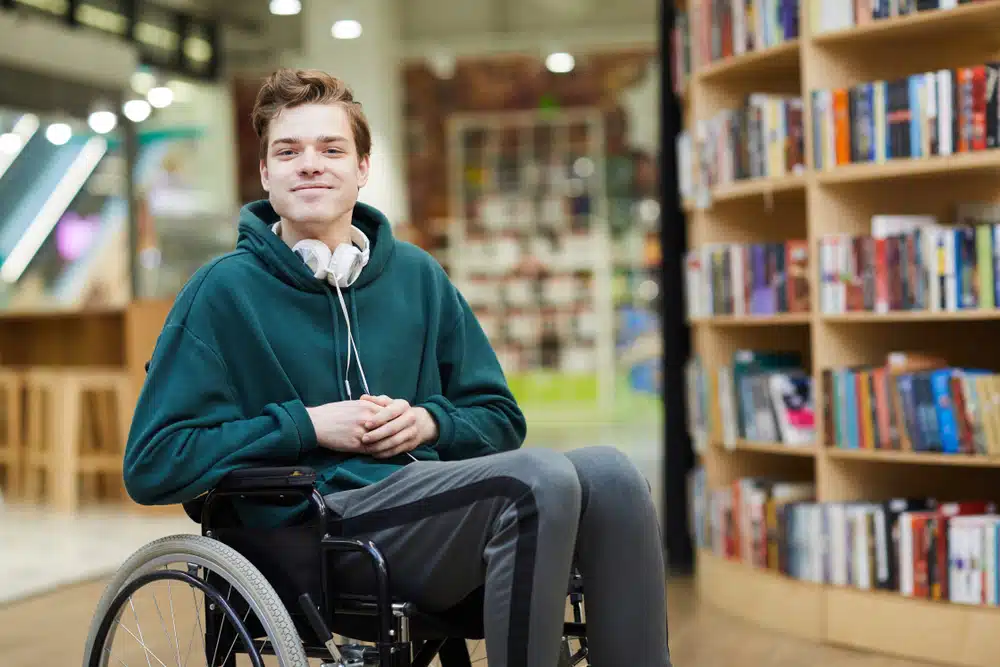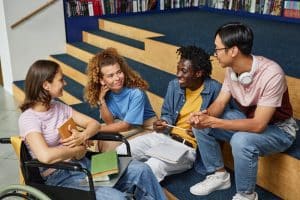Best Colleges for Students with Learning Disabilities
Students with learning disabilities face unique challenges when it comes to pursuing higher education. However, with the right support and resources, they can thrive and achieve their academic goals. In this article, we will explore the best colleges for students with learning disabilities that have gone above and beyond to create inclusive learning environments for students.
Understanding Learning Disabilities in Higher Education
Before diving into the best colleges for students with learning disabilities, it’s important to have a clear understanding of what learning disabilities entail and how they impact higher education. Learning disabilities refer to neurodevelopmental disorders that affect the way individuals process information. These disabilities can manifest in difficulties with reading, writing, math, attention, and executive functioning.
Learning disabilities are complex and can vary greatly from person to person. For example, dyslexia is a common learning disability that affects reading and language processing, while dyscalculia affects mathematical abilities. Attention-deficit/hyperactivity disorder (ADHD) is another learning disability that impacts attention and focus. These disabilities can present unique challenges in a higher education setting, where students are expected to engage in complex academic tasks.
When it comes to higher education, students with learning disabilities may require additional support and accommodations to help them succeed academically. These accommodations can include extended time for exams, assistive technology, note-taking services, and access to specialized programs.
The Importance of Supportive Learning Environments
One of the key factors that sets the best colleges for students with learning disabilities apart is their commitment to creating supportive learning environments. These environments prioritize the individual needs of students and provide the necessary resources and assistance to help them overcome challenges.
Supportive learning environments foster a sense of inclusivity and understanding. Professors and staff are trained to work with students who have learning disabilities, and there is an emphasis on providing personalized support. This can include regular check-ins, mentoring programs, and access to academic coaches or learning specialists who can provide individualized strategies for success.
Moreover, these colleges often have dedicated disability support offices that serve as a central hub for students with learning disabilities. These offices coordinate accommodations, provide guidance on navigating the college experience, and connect students with relevant resources both on and off campus. They play a crucial role in ensuring that students with learning disabilities have equal access to education and can fully participate in all aspects of college life.
How Colleges Are Accommodating Learning Disabilities
The best colleges for students with learning disabilities have implemented a range of accommodations and support services to ensure that these students can thrive academically. Some of the most common accommodations include:
- Extended time for exams to allow for processing and comprehension.
- Note-taking assistance to ensure comprehensive lecture materials.
- Access to assistive technology, such as text-to-speech software or speech recognition programs.
- Small class sizes to facilitate personalized attention and support.
- Accessible campus facilities and resources for students with physical disabilities.
These accommodations are tailored to meet the specific needs of students with learning disabilities. For example, extended time for exams acknowledges that individuals with learning disabilities may require additional time to process information and demonstrate their knowledge. Note-taking assistance ensures that students have access to comprehensive lecture materials, as difficulties with attention or processing speed may make it challenging to capture all the information in real-time.
Assistive technology plays a crucial role in supporting students with learning disabilities. Text-to-speech software can help individuals with reading difficulties by converting written text into spoken words, while speech recognition programs enable students to dictate their thoughts and have them transcribed into written form. These technological tools empower students to overcome barriers and engage more effectively with academic content.
Small class sizes are another important accommodation for students with learning disabilities. With fewer students in a class, professors can provide more individualized attention and support. This allows for a deeper understanding of the material and the opportunity to address any specific challenges or questions that students may have.
Lastly, colleges that prioritize inclusivity for students with learning disabilities also ensure that their campus facilities and resources are accessible. This includes physical accommodations such as ramps, elevators, and accessible restrooms for students with physical disabilities. Additionally, colleges may provide resources such as quiet study areas, assistive technology labs, and specialized tutoring services to further support students with learning disabilities.
Criteria for Choosing the Right College
When selecting the best college for students with learning disabilities, there are several key factors to consider. These factors should align with the student’s unique needs and goals. Some important criteria to evaluate include:
Accessibility of Resources and Support Services
One crucial aspect to consider is the accessibility of resources and support services. The best colleges will have well-established disability services offices that specialize in supporting students with learning disabilities. These offices should offer a range of resources, including assistive technology, tutoring services, and academic counseling.
For example, a college with a strong disability services office may have a dedicated assistive technology lab equipped with the latest software and hardware to assist students with different learning disabilities. The lab may have screen readers, speech recognition software, and alternative input devices to cater to the diverse needs of students. Additionally, the college may provide specialized tutoring services where students can receive one-on-one support from trained professionals who understand their unique challenges.
Moreover, an effective disability services office should offer academic counseling to help students with learning disabilities navigate their college journey successfully. This may include guidance on course selection, study strategies, and time management techniques tailored to their specific needs. The counselors may also collaborate with faculty members to ensure that appropriate accommodations are provided in the classroom.
Availability of Specialized Programs
Specialized programs designed for students with learning disabilities can make a significant difference in their academic success. Look for colleges that offer comprehensive programs that address the specific challenges faced by students with learning disabilities. These programs may include specialized courses, workshops, and peer support groups.
For instance, a college with a strong program for students with learning disabilities may offer specialized courses that focus on developing effective study skills, time management techniques, and learning strategies tailored to their needs. These courses may provide students with practical tools and resources to enhance their academic performance and build self-confidence.
In addition to specialized courses, colleges may organize workshops and seminars to educate students with learning disabilities about various topics related to their academic and personal growth. These workshops may cover areas such as self-advocacy, stress management, and assistive technology training. By participating in these workshops, students can gain valuable knowledge and skills that will help them overcome challenges and thrive in their college journey.
Furthermore, peer support groups can play a crucial role in the success of students with learning disabilities. Look for colleges that facilitate the formation of such groups where students can connect with others who share similar experiences and challenges. These support groups can provide a safe and inclusive space for students to share their concerns, seek advice, and offer encouragement to one another.
Detailed Overview of the Top 10 Colleges
College 1: Unique Features and Support Systems
College 1 stands out for its comprehensive learning disability support services. They offer peer mentoring programs, individualized academic coaching, and a learning lab equipped with assistive technology.
Furthermore, College 1 has a dedicated disability services office that works closely with each student to develop personalized accommodation plans. The professors at this college are well-trained in working with students with learning disabilities and are committed to ensuring their success.
Moreover, College 1 goes above and beyond to create an inclusive and supportive learning environment. They have a network of student organizations that focus on raising awareness about learning disabilities and advocating for equal opportunities. These organizations host events and workshops where students can connect with each other and share their experiences.
In addition, College 1 offers a range of extracurricular activities specifically designed to cater to the diverse interests of students with learning disabilities. From sports teams to art clubs, there is something for everyone to engage in and feel a sense of belonging.
College 2: Unique Features and Support Systems
At College 2, students with learning disabilities benefit from small class sizes and individualized attention. The college offers a variety of assistive technologies, including text-to-speech software and digital recording devices. Additionally, they provide easy accessibility to note-taking services and tutoring assistance.
College 2’s faculty and staff are known for their patience and understanding towards students with learning disabilities. The college also hosts workshops and seminars to equip students with the skills necessary for academic success.
Furthermore, College 2 understands that learning disabilities can impact various aspects of a student’s life. Therefore, they have a robust support system in place that extends beyond academics. They offer counseling services, career guidance, and social support to ensure that students thrive both inside and outside the classroom.
Moreover, College 2 actively collaborates with local businesses and organizations to create internship and job placement opportunities for students with learning disabilities. This hands-on experience helps students develop practical skills and enhances their employability upon graduation.
College 3: Unique Features and Support Systems
College 3 has established a reputation for its innovative approach to supporting students with learning disabilities. They offer a comprehensive support program that includes specialized courses, study skills workshops, and peer support groups.
The college also provides individualized accommodations based on the specific needs of each student. The disability services office offers regular check-ins to ensure that students are progressing academically and receiving the necessary support.
Additionally, College 3 recognizes the importance of fostering a sense of community among students with learning disabilities. They organize regular social events and gatherings where students can connect with their peers and build lasting friendships. These events create a support network that extends beyond the classroom and helps students navigate the challenges they may face.
Furthermore, College 3 actively involves students with learning disabilities in the decision-making process. They have student advisory committees that provide valuable input on policies and initiatives related to disability services. This ensures that the college’s support systems are constantly evolving and meeting the changing needs of its students.
Making the Transition to College
Transitioning from high school to college can be a daunting process, especially for students with learning disabilities. However, with proper preparation and support, this transition can be made smoother and more successful.
Preparing for the Shift from High School to College
It’s important for students with learning disabilities to familiarize themselves with the differences between high school and college. Unlike high school, where individualized education plans (IEPs) outline accommodations, students in college must self-advocate and request accommodations through the disability services office. Understanding this process and taking proactive steps can greatly contribute to a successful transition.
Tips for Success in College with a Learning Disability
Here are some helpful tips for students with learning disabilities to thrive in college:
- Develop a routine and schedule that works best for your learning style.
- Utilize campus resources, such as tutoring centers and writing labs.
- Establish open communication with professors regarding your needs and accommodations.
- Join support groups or clubs specifically designed for students with learning disabilities.
- Practice self-care and seek out mental health support if needed.
Financial Considerations for Students with Learning Disabilities
Scholarships and Grants for Students with Learning Disabilities
When it comes to financing higher education, students with learning disabilities can explore various scholarship and grant opportunities. Numerous organizations provide financial aid specifically for students with learning disabilities. These scholarships and grants can help alleviate the financial burden and make college more accessible.
Understanding Your Financial Aid Options
It’s crucial for students with learning disabilities to understand their financial aid options. They should familiarize themselves with the different types of financial aid available, such as federal aid, state aid, and institutional aid. This knowledge will enable them to make informed decisions about funding their education.
In conclusion, the top 10 colleges for students with learning disabilities stand out due to their commitment to creating inclusive and supportive learning environments. These colleges offer a range of accommodations, specialized programs, and support services that empower students with learning disabilities to succeed academically and reach their full potential. By prioritizing accessibility and individualized support, these colleges enable students with learning disabilities to thrive in higher education.









































